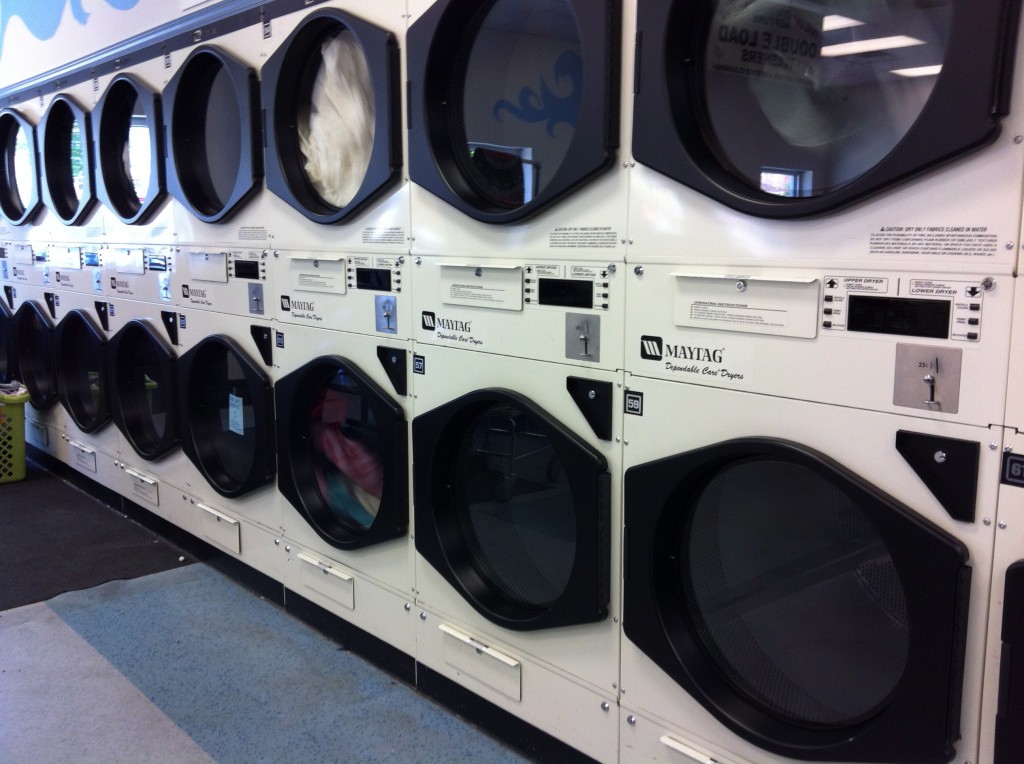 I don’t know when my love for laundry began. One of my first memories is going to a Laundromat with my mother right around the time I had finished reading Harriet the Spy. I took a small spiral notebook and a pen with me, and as my mom washed and dried our clothes and towels and bedding, I eavesdropped on the other people there and wrote down things about them. I wonder if I still have that notebook somewhere. I’d love to see it now.
I don’t know when my love for laundry began. One of my first memories is going to a Laundromat with my mother right around the time I had finished reading Harriet the Spy. I took a small spiral notebook and a pen with me, and as my mom washed and dried our clothes and towels and bedding, I eavesdropped on the other people there and wrote down things about them. I wonder if I still have that notebook somewhere. I’d love to see it now.
Another early memory is my grandmother’s wringer-washer, in the basement next to the garage, where my grandfather’s woodshop was. He had his domain down there; she had hers. I remember that washer as if I had seen it just yesterday: the black cord running from it to the wall, the stationary tub my grandmother positioned it next to, the way the clothes came out of the wringer all flat and matted and nearly dry, like large cuttlebones.
It may have been my grandmother from whom I inherited my love for laundry. I did, after all, inherit her big feet. I don’t know what it is about it, exactly. The smell of soap, 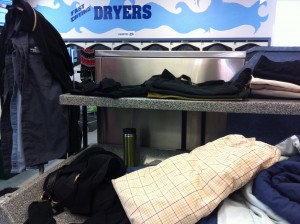 the low rumble of the machines, the ergonomics of the task itself—all these are appealing, but I think it’s the sense of renewal more than anything else.
the low rumble of the machines, the ergonomics of the task itself—all these are appealing, but I think it’s the sense of renewal more than anything else.
In the late Eighties I accidentally caught the last ten minutes of an award-winning 1981 documentary on cable titled “Clotheslines.” The filmmaker, Roberta Cantow, had interviewed several New York City women about their views on laundry.
Their responses were varied. A few, like me, loved it. But some of them had the most heartbreaking stories. Things like: “My family has no idea how much work it is.” “I never get any thanks.” “My husband has certain rules for how I must do laundry but refuses to do it himself.” “It just never ends.” I was transfixed.
Many of the women also talked about their mothers’ attitudes toward laundry. I don’t know how my mother felt about it. I tend to think that with four kids and a husband, if there was one thing she liked about it, it was that it got her out of the rest of the house and into a dark, quiet corner of the basement. She may have propped open a basement window and snuck a few smokes.
Since many years have passed since I did this, I think it’s safe to confess now. After I caught that little bit of “Clotheslines,” I wanted to see the whole show. TV listings indicated that it would be on one other time, in the middle of the afternoon during the workweek. This was way before TiVo and DVRs that you can program from your cell phones. I went to work and forgot to set the VCR to record it. I realized it in the middle of a training session. My face blanched. When someone said, “Oh my god, are you all right?” I decided to take advantage of it and say, “I feel sick. I think I have to leave for a minute.”
I got in my car, sped home, and set the VCR, just in time. When I returned my boss said, “You were gone a long time. We were worried. You OK?”
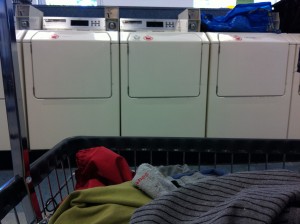
“Yes,” I said. “Yes, I am. Thanks.”
I have the VHS tape somewhere in storage. Over the years, I’ve thought about “Clotheslines” often and very fondly. Five years ago you couldn’t find anything online about it. Now you can, including the fact that the film is now available on DVD.
Right before I met and married John, I lived in a so-called luxury apartment, brand-new, with my own garage, a walk-in closet, and two bathrooms, one of them a master bath, the first one I’d ever had. I also had my own washer and dryer, in a closet next to the kitchen. It was heaven.
When I moved downtown into an old Art Deco building with John, I had to go back to sharing two washers and two dryers in the basement with fifty other people.
A few months ago, our building replaced the washers with water-saving top-loaders. The first time I opened one to add fabric softener and saw my full load of clothes being rinsed in eight inches of water, I was aghast. You couldn’t see any water—just the agitator smooshing clothes around. It was fabric abuse.
So I started taking our things to the Laundromat two and a half blocks away, where all the washers are fabric- and environmentally friendly front-loaders, Tuesday through Thursday are one-dollar double-load days, and the attendants are sweet—not at all the sort who will angrily remove your soaking wet clothes from the washer because they think you’re taking too long, like some of our neighbors. I take my laptop there sometimes, sometimes a book, sometimes both.
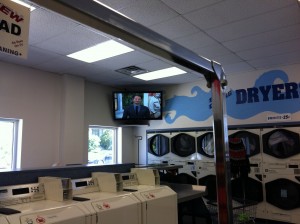 If I had my druthers, I’d buy a Laundromat and do most of my writing there. The mild chaos in the background—TV, rushing water, clinking coins, nonstop machine hum—helps drown out my inner critic and enables me to be very productive.
If I had my druthers, I’d buy a Laundromat and do most of my writing there. The mild chaos in the background—TV, rushing water, clinking coins, nonstop machine hum—helps drown out my inner critic and enables me to be very productive.
If I had a Laundromat, however, there would be rules. No quarreling. No crying newborn babies. No blocking the aisles with your large laundry basket gizmos. Some of which make me wonder, where on earth did you find that?
If you look twenty years old and ask me how to work the machines and how much soap you need to put in, I will give you the skunk eye, ask for your mama’s phone number, and then go back to my writing.
No panhandling. No wearing of sunglasses or carrying on loud one-sided cell conversations. No hitting on women who clearly do not want to be bothered. TVs: for sure. But they never play anything with Giuliana Rancic or Justin Bieber in it.
If you are a man hitting on a woman, and you suddenly get all sweet and friendly after you see she’s annoyed, that is allowed.
But if, after things have been going so nicely, you blurt out, “So are you happily married?” you are not allowed to do that in my Laundromat.
My Laundromat also will not offer “we will wash your clothes for you for a fee.” Because I don’t want to be anywhere near your dirty drawers. Let’s not forget that I own this joint so I can write. And I’ve got work to do.
To view a three-minute clip of “Clotheslines,” visit Roberta Cantow’s Web site and click on “Sample Links.” To purchase a copy of the film, click on “Contact.”

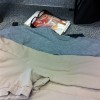
Recent Comments